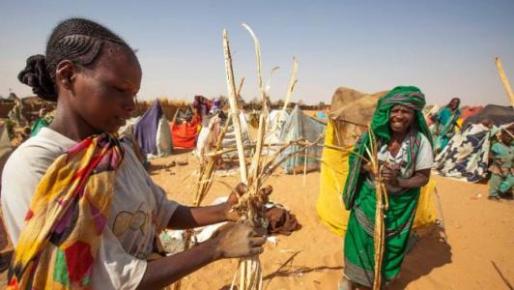Darfur IDPs in Zam Zam camp reject voluntary return

October 6, 2016 (EL-FASHER). Darfur Internally Displaced Persons (IDPs) living in Zam Zam camp south of El-Fasher, capital of North Darfur have rejected Sudanese government call for voluntary return, citing security concern in their home villages.
On Monday, representatives of IDPs in Zam Zam camp told the U.S. delegation led by the Chargé d’Affaires Ervin Massinga that their voluntary return is linked to the provision of services and security in their home villages.
In statements to Sudan Tribune, the tribal leader Eisa Adam said that they refuse to return as the causes of their displacement are not addressed yet.
“We cannot voluntarily return to our villages unless the causes of our displacement are addressed,” said Adam, stressing that if they go back now then it would be a forcible return.
SInce the signing of the Doha Document for Peace in Darfur in July 2011, the government constructed several villages and vowed to support IDPs who return to their home areas.
However, the displaced complain that the security situation remains the same pointing to the government militia saying they continue to attack them and grab their land.
The tribal leader pointed that IDPs residing in Zam Zam camp suffer acute shortage of water and medicines and delays in distributing the monthly food rations provided by the World Food Programme (WFP).
“WFP distributes food rations to 40% of the camp IDPs, 13% were informed that their data is not matching and the rest were excluded from receiving humanitarian aid,” said Adam.
He further called on the United Nations to provide water, medicines and other humanitarian items to IDPs in Zam Zam camp.
A delegation led by the U.S. Chargé d’Affaires Ervin Massinga and Sudan Mission Director for the US Agency for International Development (USAID), Jeffrey Ashley, completed a visit to Darfur from 3 to 4 October.
The U.S delegation met with a wide range of individuals and organizations in North Darfur capital, El-Fasher including government officials, representatives from the United Nations, international humanitarian organizations and civil society, members from hybrid peacekeeping mission in Darfur (UNAMID), community leaders and IDPs.
The delegation also visited Zam Zam IDP camp to observe and better understand how humanitarian assistance and food aid from the American people, provided through USAID, is benefiting displaced people in Darfur.
Over 100,000 displaced people from various areas in Darfur are residing in Zam Zam camp. New IDPs arrive in the camp whenever a new crisis erupts in the region.
UN agencies estimate that over 300,000 people were killed in Darfur conflict since 2003, and over 2.5 million are displaced.
(ST)
